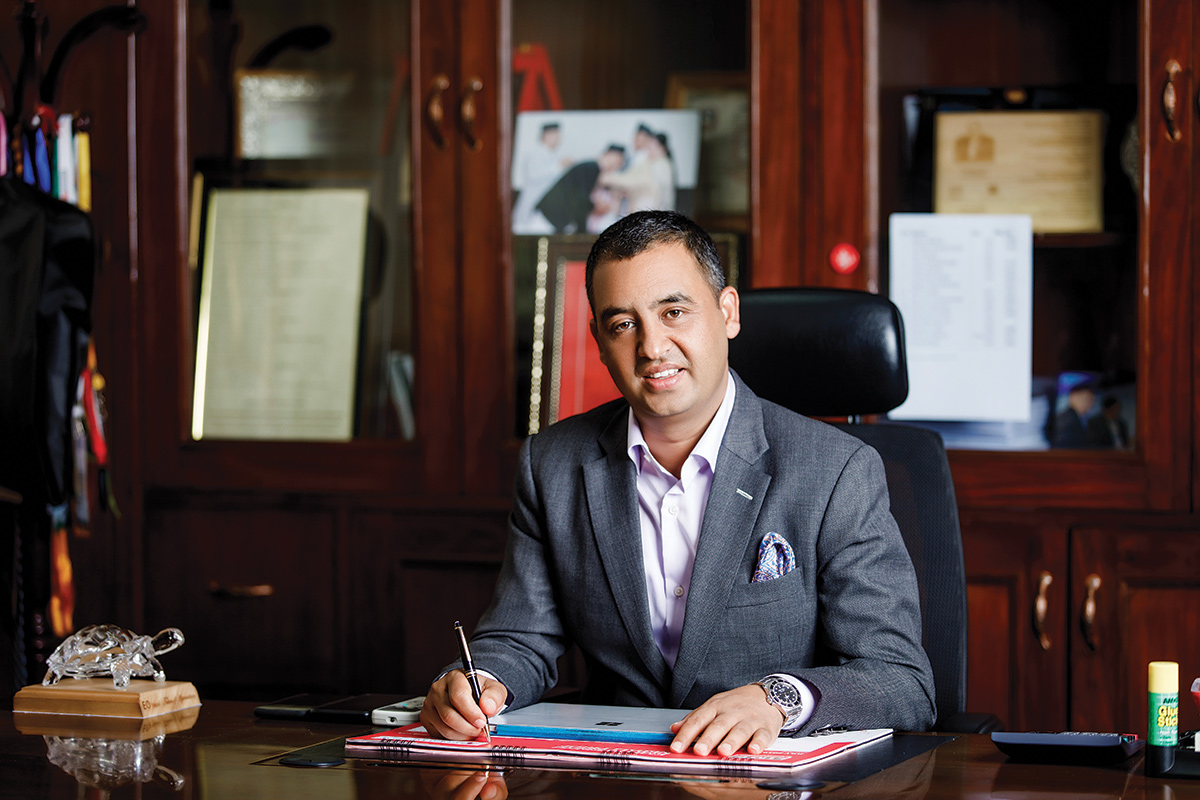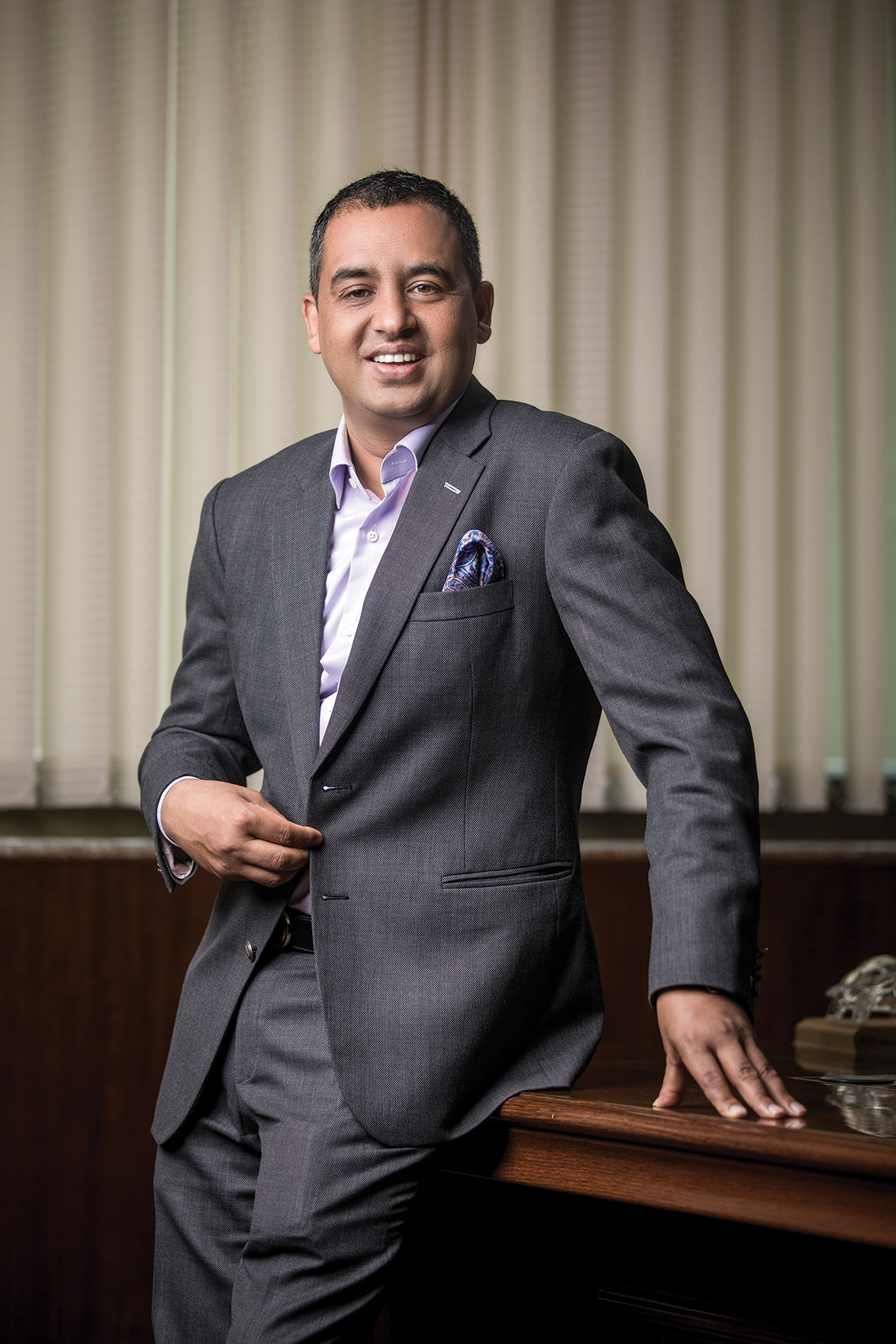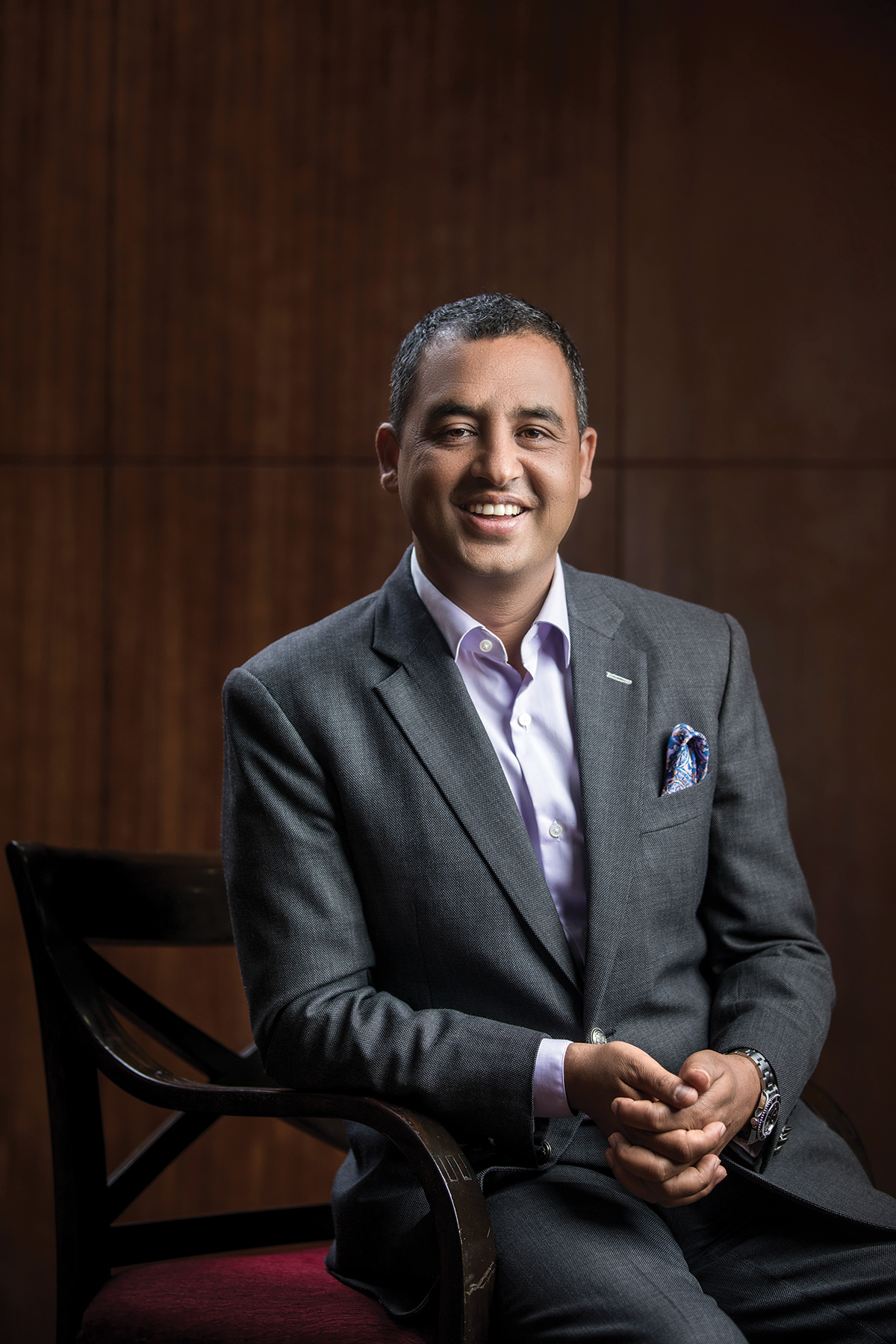
Text by Avant Shrestha
Nepal is heavily reliant on remittance. Until the mid 90s and the early 20s, the regulatory channel for remittance coming into the nation can be best described as vague. In 2001, Hem Raj Dhakal along with his brother Chandra Prasad Dhakal ventured into the remittance business by establishing International Money Express.
It was a pioneering venture that changed the shape of the industry.
Currently, he holds the position of Managing Director at IME. IME is the country’s first and leading private sector money transferring enterprise. The establishment of IME was an innovative step for Nepal’s remittance and financial system as it established a formal channel to bring remittance into the country.
Consequently, in a short span of time, Hem Raj Dhakal has become synonymous with the financial sector of the nation.
He is also a bona fide serial entrepreneur holding the position of Co-Founder and Managing Director of IME Ltd. Additionally, Dhakal is the Chairman of IME General Insurance; Chairman of Hathway Investment Nepal, one of the largest investment companyies in Nepal, and Founding Chairman of Chandragiri Hills, a Rs 3.2 billion project, among several other business interests.
As Co-Founder and Managing Director of IME Group of Companies, one of the fastest-growing business conglomerates in the nation, he plays an integral role in the expansion of its domestic and global business network.
Origins
Dhakal was born in Baglung in 1975. “I came from a small village and my mother and my brother have always been a huge influence on me,” expresses Dhakal. As a young man Dhakal worked in a government job but he felt unfulfilled and wanted to pursue something that would make an impact on people’s lives. He says, “I did not want to work just for me; I wanted to work in a larger space and impact a larger community”. Today, Hem Raj Dhakal is widely known not only in the domestic but international business circles as well.
Behind the corporate persona, Dhakal is humble and considers himself an entrepreneur with a passion to pursue new ventures especially in the financial ecosystem in Nepal. Today his strong leadership and extensive experience in various sectors can be attributed to determination to succeed.
Initially, Dhakal wanted to become a doctor but life had different plans for him. “I came into this sector by chance,” reminisces Dhakal. “As a business we started very small but as the business progressed, we started expanding into new sectors. Our main focus, however, remains in the service sector,” shares Dhakal.


IME
Dhakal recalls, “I believe the germination of the business idea and its inception was in 1995 when I was in Japan. But we formally established IME in 2001. During the initial stages of the company, Dhakal was involved hands-on in all aspects of the business and this gave him the opportunity to learn and gain insight into all details of running the business, “I am the type of person who goes in-depth in whatever I do. I like getting into the center of the operation and work on it firsthand. I like to see and observe the nitty-gritty.”
Establishing IME during the initial stages was challenging because when Dhakal started the company, the entire concept was new, “Basically, there was a risk that this concept would be rejected by the people and the government. There were a host of legislation issues as well. Government had to give us license in order to operate our business which was a bit tricky to obtain back then.”
Additionally, they were not very familiar with technology in the beginning. They needed to learn and adapt at a fast pace. Similarly, setting up delivery channels nationwide and gaining the trust of the people was challenging. The idea of a business designed to transfer money securely was particularly difficult. Before IME was firmly established, banks operated under certain mechanisms and the private sector applied another sort of mechanism. “People, in general, are skeptical when it comes to trusting the capability of a private company. Therefore, to overcome that challenge, we personally went to people and built trust among our customers,” explains Dhakal.
Dhakal and IME played a pivotal role in institutionalising the remittance industry in the country. According to Dhakal, time played an important role. He explains, “During that time when we had just started, Nepal was not politically stable and lots of people were opting to go abroad in search of work. People were going abroad but the money which the country was in dire need of was not coming in. When we made legitimate business plans, the regulators were convinced and they facilitated us. If the government hadn’t facilitated us then, we wouldn’t have had the opportunity,” he explains.
Current Industry Status
Duplication of idea is a common phenomenon in business. “Rather than innovation there is a trend to practice imitation,” states Dhakal. During the garment boom, everyone started getting involved in that industry, then came carpets followed by pashmina. Now everyone is jumping into the remittance bandwagon. Dhakal stresses, “Sadly, there is an imitation tendency here, but at our end we have always believed in innovation and we strive to introduce new and timely products and services into the market. We like to call it our ‘pioneering spirit’,” he adds.
Organisational Culture
Dhakal leads multiple organisations across various verticals of the group. He claims that when it comes to implementing an ideal organisational culture, first and foremost you have to start with yourself. “During my journey and time abroad, I had the opportunity to observe and learn how international organisations operate and have a cohesive and efficient organisational culture. I try to emulate that and implement it here in my organisation as well,” he expresses.
Today the IME conglomerate has made its presence felt in remittance, banking, insurance, logistics, tourism, automobile, entertainment and energy sectors. Yet, Dhakal is unfazed by the pressure. He has full trust in the capacity and capability of his team. “We - as a board - take care of the strategies. Of course, we have our own ideas and visions and to execute those visions we have a competent team. Basically, they exhibit team spirit. And this drives the team forward,” Dhakal explains.
Serial Entrepreneur
Dhakal is a legitimate serial entrepreneur. He continues to build on his passion and desire to venture into innovative business ideas. According to him, entrepreneurship is creating something that adds value in the lives of your community, city and country. He explains, “There is a difference in the past and the present context of entrepreneurship. Today, the young population is interested in the idea of entrepreneurship and are hands-on involved in bringing new ideas and establishing new startups. In the past, if certain ideas came forward, there were not many funding mechanisms available nor was there any support system,” he delibrates. Today, upcoming and aspiring entrepreneurs are fortunate to have investors and mentors who are willing to scale up their startups. As the entrepreneurial ecosystem continues to expand in Nepal, Dhakal stresses that failure is part of the journey and entrepreneurs and youths of Nepal should not be afraid to fail.
Growth
Dhakal wants to constantly learn, gain information and develop himself both personally and professionally. Joining The Entrepreneurs’ Organization (EO), a global peer-to-peer network of influential business owners and entrepreneurs that enables leading entrepreneurs to learn and grow in various aspects of business, gave him the opportunity to pursue higher studies and courses in prestigious international institutes and expand his knowledge and global network.
Dhakal recently completed his Entrepreneurial Master Program course from Massachusetts Institute of Technology (MIT). “My time spent at EO and MIT was a fulfilling experience personally,” Dhakal states. “When I was younger, I did not have the opportunity to go to good educational institutions. That’s why I always had an interest in attending a prestigious institution. Besides, when you are working in a professional setting for so long and you get the opportunity to become a student again, you tend to view a lot of your work through a different perspective. Lastly, join a college which allows you to network with fellow professionals and observe their working methodologies and gain insight into their respective industries as well,” shares Dhakal.
He explains, “In MIT, they have designed the course keeping real life at the center. One of the programs that stayed with me was called ‘Scaling Up’. I believe that specific courses have helped me as I implemented those lessons into my daily and professional life.”

Philanthropy
In 2009, Dhakal co-founded IME Foundation with the objective of helping the children of migrant workers who had lost their lives abroad. The foundation supports the children financially as well as in facilitating their education.
Additionally, they have recently rebuilt a school that was destroyed during the 2015 earthquake. The foundation offers scholarship to a certain number of children every year and has built a mechanism by establishing ties with the government to take their educational efforts outside of the capital as well.
The Future
When it comes to the future of the financial sector, e-banking remains at the core of the conversation. Dhakal believes that the future of e-banking in Nepal has positive prospects. He explains, “Telecommunication and mobile technology penetration is almost 100% and internet penetration is also increasing every year; as a result, banking service, especially financial services would be easier to take to remote areas through the medium of mobile and telecommunication technology”.
“At the same time, technology is changing at such a rapid pace, one should be able to adapt at speed. Technological awareness is the key,” he adds.
Dhakal is firmly focused on the expansion of IME Group. “Currently, our main target is to establish IME Pay in the market which basically brings both banked and under-banked population into the banking system. This will consequently bring financial access into rural areas and enhance the lives of the people there,” explains Dhakal.
Besides Business
For a man of Dhakal’s caliber who manages and operates multiple mega companies, he enjoys the simpler things in life. He plays tennis whenever he has the time. “For the last 20-22 years, I have been heavily involved in tennis. As relaxing as it is, the game is very demanding as well; there are lots of practical aspects of the game such as decision making and endurance that have consequently helped me in professional settings as well,” Dhakal explains. Additionally, for him tennis is not just an individual game, his two daughters and wife regularly accompany him on the court. Dhakal says, “Tennis has become our family bonding session.”
Apart from letting his guard down on the court, Dhakal meditates every day for half an hour, likes to read books, and more importantly spend time with his family.


-1713949388.jpg)
-1713779693.jpg)
-1712728897.jpg)